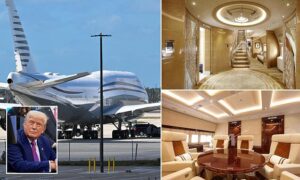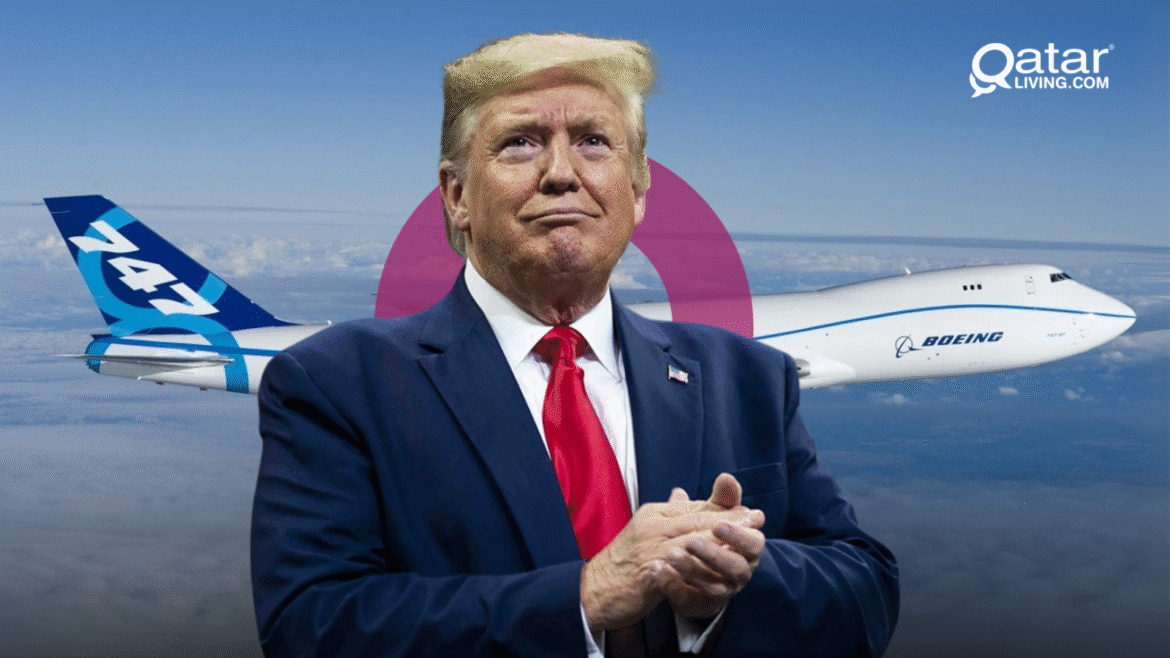President Donald Trump has expressed strong support for a plan under which the United States could receive a luxury jumbo jet from Qatar, intended for temporary use as Air Force One. Speaking to reporters at the White House on Monday, President Trump characterized the aircraft as a “gift” from the Qatari government, adding that he would be “a foolish person” not to accept such an offer.
However, Qatari officials were quick to clarify the nature of the deal, stressing that it would be inaccurate to refer to the plane as a gift. Instead, they described ongoing discussions concerning the aircraft’s potential temporary use by the U.S. government. This clarification appears to be an attempt to distance Doha from the optics of a personal favor to the president.
The development comes just days before President Trump is scheduled to make a high-profile diplomatic visit to Qatar, marking his first major overseas trip since beginning his second term in office. The timing of the proposed transfer has fueled speculation about the motivations behind the offer and the implications it may have for U.S.-Qatar relations.
In his remarks, President Trump emphasized America’s long-standing contributions to Qatar’s security infrastructure, noting the U.S. has “helped Qatar a lot over the years in terms of safety and stability.” He praised the Qatari leadership and suggested that receiving a modern aircraft from the Gulf nation would be a “very nice gesture.”

The aircraft in question is a Boeing 747-8, a significantly upgraded version of the planes currently serving as Air Force One. The current presidential fleet includes two aging Boeing 747-200B aircraft, which have been in operation since the early 1990s. Although the Trump administration previously negotiated a contract with Boeing to deliver two new 747-8s, the planes have yet to be delivered, and may not arrive for another two to three years.
The Qatari jet, valued at an estimated \$400 million, is reportedly outfitted with high-end interiors and has been referred to in the media as a “flying palace.” Before it could be used for presidential travel, it would require significant retrofitting and security clearances. While Trump’s interest in an interim solution is understandable given delays from Boeing, the proposal has triggered a wave of legal and ethical concerns.
At the heart of the controversy is the U.S. Constitution’s Emoluments Clause, which bars federal officials from accepting gifts or payments from foreign governments without congressional approval. Critics argue that even a temporary transfer could violate this principle, particularly if it is perceived as benefiting President Trump personally.
Democratic lawmakers have called for a formal investigation. Senator Adam Schiff of California publicly cited constitutional provisions prohibiting any gift from a foreign state without consent from Congress. Congressman Ritchie Torres of New York went further, urging the Government Accountability Office to examine the matter and suggesting that the jet could represent the most extravagant benefit ever offered to a sitting president by a foreign entity.
Notably, criticism has not been limited to Trump’s political opponents. Prominent conservative voices have also expressed concern. Daily Wire commentator Ben Shapiro questioned whether accepting the jet serves Trump’s policy goals or aligns with his pledge to “drain the swamp.” He labeled the proposed deal as ethically suspect and politically detrimental.
Far-right activist Laura Loomer, a long-time Trump loyalist, was even more pointed in her criticism. While reaffirming her dedication to the president, she warned that accepting the plane would be “a stain” on his administration, suggesting it contradicts the values his supporters hold dear.
In response to the growing scrutiny, White House Press Secretary Karoline Leavitt assured the public that the Trump administration remains committed to full compliance with applicable laws. She emphasized that any gift from a foreign government would be handled transparently and in accordance with U.S. legal frameworks.
The potential plane acquisition adds to a history of entanglements between Trump and Qatar. Recently, the Trump Organization finalized a deal to build a luxury golf resort in the Gulf nation—the first major international business venture for the company since Trump’s return to office. That development has fueled further questions about the intersection of Trump’s public duties and private interests.
Sources have indicated that the plane, if accepted, would ultimately be donated to President Trump’s presidential library at the end of his term. While Air Force One aircraft typically remain in service across multiple administrations, there is precedent for retiring them into presidential collections—Ronald Reagan’s library currently displays one such plane.
Legal scholars, including Georgetown University’s Professor David Super, have raised concerns about the arrangement. He noted that while the plane might officially be transferred to the U.S. government, the potential for post-office personal use could constitute a violation of ethics laws. If Trump were to leverage the aircraft for personal or political gain after leaving office, the situation could escalate into a constitutional breach.
While Congress has the power to issue a resolution condemning the transfer, such action appears unlikely due to the Republican majority in both chambers. Even if passed, such a resolution would be symbolic rather than legally binding, doing little to block the actual handover of the jet.
This unfolding situation adds to the long-standing scrutiny Trump has faced over potential conflicts of interest. During his first term, he was criticized for profiting from his Washington D.C. hotel and other ventures while in office. A lawsuit over his alleged violation of the Emoluments Clause was filed but never resolved.
As the president prepares for his upcoming visit to Doha, the jet deal will likely remain in the spotlight. Whether the plane ultimately joins the U.S. presidential fleet or is sidelined due to political pressure, the controversy underscores the complex ethical terrain navigated by presidents with significant private interests abroad.

